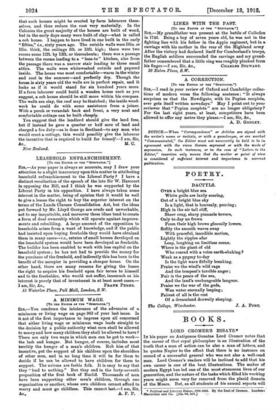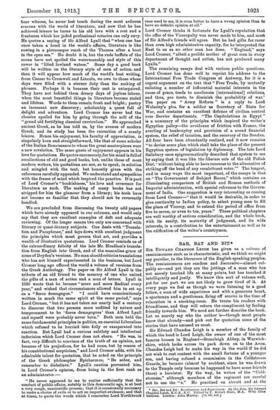BOOKS.
LORD CROMER'S ESSAYS.* IN his paper on Antigonos Gonatas Lord Cromer notes that the career of that royal philosopher is an illustration of the truth that a man of action can be also a man of letters, and he quotes Napier to the effect that there is no instance on record of a successful general who was not also a well-read man. Lord Cromer's readers will be inclined to add that his own career is one of the best illustrations. The maker of modern Egypt has led one of the most strenuous lives of our generation, and the nature of the tasks which filled his working years might seem very far removed from the placid domain of the Muses. But, as all students of his annual reports will • Political and Literary Essays, 1908-1913. By the Earl of Cromer. London*
.Macmillan and Co. [10s. 6d. net.] •
bear witness, he never lost touch during the most arduous seasons with the world of literature, and now that he has achieved leisure he turns to his old love with a zest and a freshness which her jaded professional votaries can only envy. He quotes a saying of Sir Alfred Lyall that " when one has once taken a hand in the world's affairs, literature is like rowing in a picturesque reach of the Thames after a bout in the open sea." No doubt it is, but the rude buffets of the ocean have not spoiled the watermanship and style of this rower in "lilied lowland waters." Some day a good book will be written on the literary style of men of action, and then it will appear how much of the world's best writing, from Caesar to Cromwell and Lincoln, we owe to those whose days were filled with a sterner duty than the making of phrases. Perhaps it is because their zest is unimpaired. They have not behind them dreary days of joyless labour, when the most beautiful things in literature become staled and lifeless. Words to them remain fresh and bright ; poetry an incessant new discovery ; scholarship a quest full of delight and adventure. Lord Cromer has never had the classics spoiled for him by going through the mill of the "grand old fortifying classical curriculum." He approached ancient Greek, as he has told us, by the avenue of modern Greek, and its study has been the recreation of a scanty leisure. Hence his enjoyment, his faculty of appreciation, is singularly keen and straightforward, like that of some scholar of the Italian Renaissance to whom the great masterpieces were a new revelation. The same gusto of enjoyment appears in his love for quotations. He quotes enormously,for his mind is full of recollections of old and good books, but, unlike those of most modern writers, his quotations are not, so to speak, in solution and mingled with the text, but honestly given with the references carefully appended. We understand and sympathize with the frame of mind which inspired the practice. It is part of Lord Cromer's "bookishness," his love and reverence for literature as such. The making of many books has not stripped for him the glamour from a library; his tools have not become so familiar that they should not be reverently handled.
We are precluded from discussing the twenty odd papers which have already appeared in our columns, and would only say that they are excellent examples of deft and adequate reviewing. Of the longer essays two only are concerned with literary or quasi-literary subjects. One deals with "Transla- tion and Paraphrase," and lays down with excellent judgment the principles which must govern that art, and provides a wealth of illustrative quotations. Lord Cromer reminds us of the extraordinary felicity of the late Mr. Headlam's transla- tion from English into Greek, and of the masculine grace of some of Dryden's versions. No man should criticize translations who has not himself experimented in the business, but Lord
Cromer long ago offered the world a volume of versions from the Greek Anthology. The paper on Sir Alfred Lyall is the tribute of an old friend to the memory of one who united the gifts of a man of action and a man of letters. Lyall in 1866 wrote that he became " more and more Radical every
year," and wished that circumstances allowed him to set up as a "fierce demagogue." "I could have conscientiously written in much the same spirit at the same period," says Lord Cromer, "but it has not taken me nearly half a century to discover that two persons more unfitted by nature and temperament to be fierce demagogues' than Alfred Lyall and myself were probably never born." Both men held the same fundamental principles in politics, an essential Liberalism which refused to be hurried into folly or exasperated into reaction. But Lyall had a curious subtlety and intellectual indecision which Lord Cromer does not share. " He was, in fact, very difficult to convince of the truth of an opinion, not because of his prejudices, for he had none, but by reason of
his constitutional scepticism," and Lord Cromer adds, with his admirable talent for quotation, that he acted on the principle of the Greek philosopher Epicharmus, " Be sober, and remember to disbelieve." Lyall's caution prevented him, in Lord Cromer's opinion, from being in the first rank as an administrator:— "He never appeared to me to realize sufficiently that the conduct of public affairs, notably in this democratic age, is at best a very rough, unscientific process; that it is occasionally necessary to make a choice of evils or to act on imperfect evidence; and that at times, to quote the words which I remember Lord Northbrook
once used to me, it is even better to have a wrong opinion than to have no definite opinion at all."
Lord Cromer thinks it fortunate for Lyall's reputation that the offer of the Viceroyalty was never made to him, and moat of Sir Alfred's friends will agree. But he had gifts far rarer than even high administrative capacity, for he interpreted the East to us as no other man has done. " England," says Lord Cromer, "albeit a prolific mother of great men in every department of thought and action, has not produced many Lyalls."
The remaining essays deal with various public questions. Lord Cromer has done well to reprint his address to the International Free Trade Congress at Antwerp, for it is a cogent argument on the text that " Free Trade, by mutually enlisting a number of influential material interests in the cause of peace, tends to ameliorate [international] relation; and thus, pro tanto, to diminish the probability of war.' The paper on " Army Reform " is a reply to Lord Wolseley's plea for a soldier as Secretary of State for War, and contains an excellent defence of civilian control over Service departments. "The Capitulations in Egypt" in a summary of the principles which inspired the writer's Egyptian policy—the avoidance of friction with France, the averting of bankruptcy and provision of a sound financial system, the relief of taxation, and the recovery of the Soudan. All four have been abundantly realized, and it now remains " to devise some plan which shall take the place of the present Egyptian system of legislation by diplomacy. The late Lord Salisbury once epigrammatically described that system to me by saying that it was like the liberum veto of the old Polish Diet, without being able to have recourse to the alternative of striking off the head of any recalcitrant voter." The longest, and in many ways the most important, of the essays is that on " The Government of Subject Races," which contains an illuminating comparison of British and Roman methods of Imperial administration, with special reference to the Govern- ment of India. One suggestion is very interesting as coming from Lord Cromer—" that it would be desirable, in order to give continuity to Indian policy, to select young men to fill the place of Viceroy, and to extend the period of office from five to seven, or even to ten, years." These political chapters are well worthy of serious consideration, and the whole book, with its sanity, its maturity of judgment, and its wide interests, is a contribution to the entertainment as well as to the edification of the writer's countrymen.



























































 Previous page
Previous page